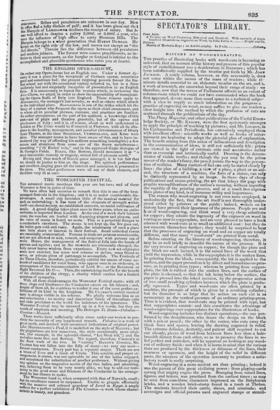• THE ENGLISH OPERA-110 USE,
OS rather any Opera-house but an English one. Under a former tly- vasty it was a place for the receptacle of German operas, sometimes good and sometimes bad: the present reigning powers favour the Ita- lian school not with the occasional variety referred to, but in a form uniformly bad and singularly incapable of presentation in an English torus. It is unnecessary to repeat the reasons which, in reviewing the Love-Charm, we urged, in order to show the impossibility of transplant- ing the Opera Buffa of Italy into England. These reasons apply to Scaranwecia, the manager's last novelty, as well as others which attach to the individual piece. Scaramuccia is one of the trifles which hit the fancy of a nation who frequent the opera as their chief amusement, and to whom all its peculiar phrases, customs, and practices are familiar. Its author presupposes, on the part of his auditors, a knowledge of this sort—not of plays and theatres, generally, but of the operas and playhouses of Italy ; and it is, of course, about as well understood in London as The Critic would be if enacted at Florence, with all its allu- sions to the locality, management, and peculiar circumstances of Drury Lane Theatre, at the time SHERIDAN; CUMBERLAND, and KING were alive. The manager seems to have been aware of this, and to have in- troduced (by way of affording his auditors something intelligible) a few scenes and situations from some one of the Surry melodramas— something " th' Ercles' vein," and in the approved tragic dialogue of St. George's Fields. Hume, like Bottom, should announce it as " a most lamentable comedy or tragedy, mixed full of pleasant mirth." Having said thus much of J3A1.ne quasi manager, it is but fair that we should do justice to him on the stage. His spirited performance
and excellent singing gave all the interest and animation it possessed to the piece. The other performers were all out of their element, and therefore very ill at case.


























 Previous page
Previous page